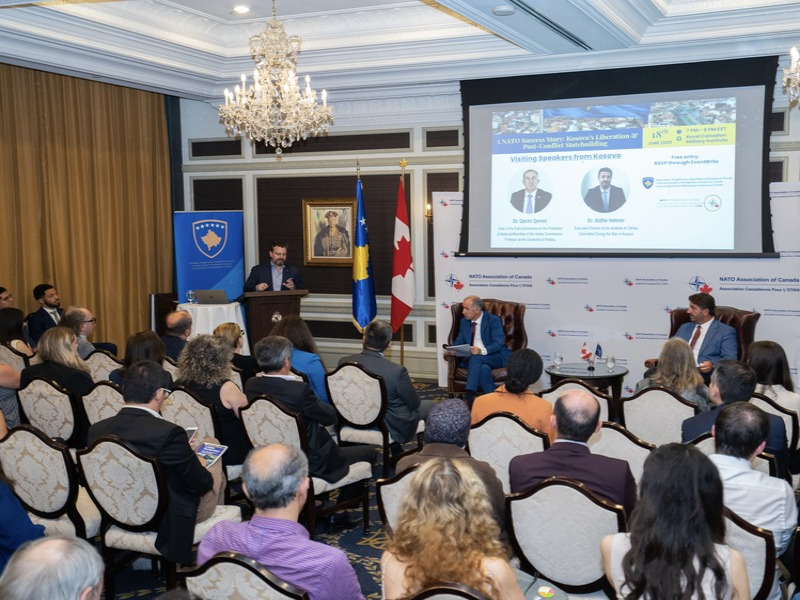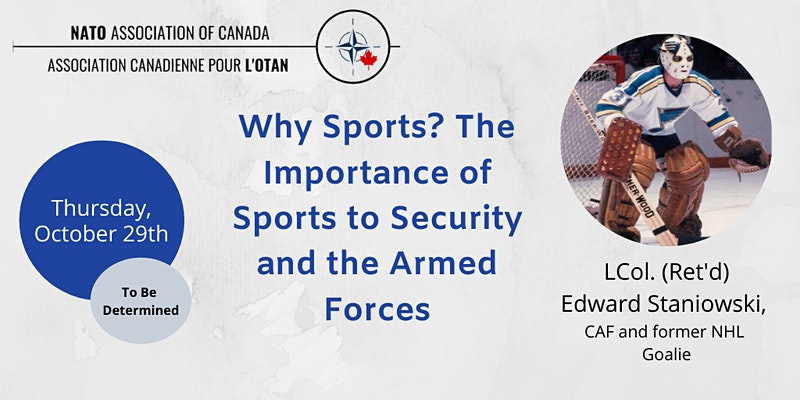On June 18, the NATO Association of Canada (NAOC), in partnership with the Consulate General of the Republic of Kosovo in Toronto, organized an event marking the 26th anniversary of Kosovo’s Liberation. The evening featured two guest speakers: Dr. Atdhe Hetemi, an Executive Director at the Institute of Crimes Committed During the War in Kosovo (ICCW), and Dr. Qerim Qerimi, Chair of the Sub-Commission on the Protection of National Minorities of the Venice Commission and Professor at the University of Pristina. The event was attended by over 60 participants and included two art showcases as well as a cultural performance.
The evening opened with remarks from NAOC CEO Robert Baines, who emphasized that, despite significant opposition and calls for alternative approaches to conflict resolution, NATO executed a successful military intervention in Kosovo. Robert emphasized the importance of reflecting on this landmark operation and applying its lessons to present-day political challenges, many of which also require NATO’s strong and decisive action.
The event proceeded with a testimony of a sexual violence survivor during the Kosovo War. The graphic account reminded the audience of atrocities suffered by the Kosovars during the conflict while simultaneously highlighting the strength and resilience of those who underwent the post-conflict recovery journey. This was followed by a performance from Ledor Babatinca, a member of the Kosovar diaspora, who sang about the war experiences of his people. The art exhibition featured a collection of Wade Goddard’s photographs taken during the conflict. It focused on portraying violence and displacement endured by the civilian population, underscoring the far-reaching impact of war beyond the battlefield. The art showcase also included a second exhibit provided by the ICCW. Together, the personal testimony, musical performance, and visual installations added an emotional layer to the event, moving it beyond academic discussion and allowing the audience to connect with the lived experiences of those affected by the Kosovo War.
The first guest speaker, Dr. Atdhe Hetemi, spoke about the challenges of documenting the war crimes committed during the conflict and shared his insights on the importance of rigorous methodology in bringing about transitional justice. He highlighted that the purpose of documentation is not to seek revenge, but rather to foster sustainable peace and reconciliation. The broader goals also include the integration of ICCW’s findings into the education curricula, enhancement of legal accountability, and prevention of future violence and denialism. To achieve these objectives, the institute is actively fostering partnerships with local and international NGOs, academic institutions, and judicial bodies. Dr. Hetemi acknowledged that while ICCW has several global allies, cooperation with Serbia remains limited at this time.
The second speaker, Dr. Qerim Qerimi, discussed the legality and legitimacy of NATO’s intervention in Kosovo, noting that the Serbian attack demanded a response beyond what existing international law was equipped to offer. While initially outside the UN Charter-established framework, NATO’s operation in Kosovo, alongside earlier violence in Rwanda and Bosnia, fueled the development of the Responsibility to Protect (R2P) doctrine. It pushed the law to accommodate situations when massive atrocities must be stopped, but the Security Council remains backlogged and cannot respond to a crisis. Dr. Qerimi underscored Canada’s role in establishing the International Commission on Intervention and State Sovereignty, thereby being a central force in crafting the R2P principle. The speech concluded with a discussion of Kosovo’s development journey during the last two and a half decades. Dr Qerimi emphasized the country’s commitment to democracy and European integration, highlighting that it has been possible in large part due to NATO’s military intervention, the peace deal brokered by the alliance, and its subsequent post-conflict integration efforts.
During the Q&A session, both Dr. Hetemi and Dr. Qerimi discussed the transferability of Kosovo’s experiences to other contemporary conflict settings, such as those of Palestine, Sudan, and Ukraine. Dr. Hetemi spoke about ICCW’s collaboration with Ukraine on the documentation of Russian war crimes. He emphasized the need for Ukraine not to repeat Kosovo’s mistakes and record war crimes during the active stage of the conflict, without waiting for a ceasefire. Dr. Hetemi also noted ICCW’s efforts to share its methodology with Ukraine and urged the country to establish a state-sponsored war crime investigation and documentation body. In closing, Dr. Qerimi remarked that despite persistent conflict, the world has experienced a significant decline in direct violence since the end of the Second World War. This suggests that while it is important to address contemporary conflicts with decisive and context-specific interventions, it is equally essential to reflect on global successes in decreasing violence and bringing about peace. As underscored by this event, NATO’s intervention in Kosovo is one example of such a success that should be learned from and emulated in other settings.




